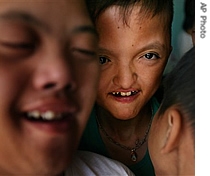2007年VOA标准英语-US, Vietnam to Cooperate on Agent Orange Damage(在线收听)
Hanoi
26 June 2007
When Vietnamese President Nguyen Minh Triet met United States President George Bush in Washington last week, they announced new efforts to tackle the damage caused by Agent Orange. Although the countries agreed victims of Agent Orange need help, scientists are still arguing over how harmful the chemical defoliant really was. Matt Steinglass has more from Hanoi.
 |
| A group of boys play together at a center for Agent Orange victims in Danang, Vietnam (File) |
For many years, the United States rejected Vietnamese appeals for compensation for these victims, saying claims that diseases were caused by Agent Orange were not supported scientifically.
But recently, the U.S. has increased funding for medical aid to people with disabilities in Vietnam, and the U.S. Congress has appropriated $3 million for cleanup and treatment of dioxin-related illnesses.
Tom Leckinger, Hanoi representative of the Vietnam Veterans of America Foundation, is pleased.
"I've been involved with Agent Orange literally since like the late '70s [1970s]," he said. "It has moved more in the past two years than it had in the entire the decades prior to that."
At a recent workshop in Hanoi, the U.S. Department of Defense presented Vietnam's Defense Ministry with an exhaustive two-year study showing how much Agent Orange had been stored and sprayed, and where.
Nathan Sage, environment officer at the U.S. Agency for International Development in Hanoi, says such cooperation is part of the countries' increasingly friendly relationship.
"The level of cooperation on this issue has never been better," said Sage. "And we will continue to support them because they asked for the assistance."
Leckinger says attitudes began to shift in late 2005, when a study by a chemical analysis firm, Hatfield Consultants, showed high levels of dioxin contamination on former U.S. bases where Agent Orange was stored, but no contamination in the countryside.
"I believe that freed up the Vietnamese government to finally come forward and say, 'Now we have to address this,' without being concerned about export issues, agricultural and seafood exports," he said.
It also reassured the U.S. that assistance could focus on cleaning up dioxin "hot spots" near former U.S. bases.
Although the governments are cooperating, the scientists still often disagree on how much Agent Orange-related dioxin is in Vietnam, and what the health effects are.
U.S. scientist Alvin Young has been studying Agent Orange since the early 1970s. He says the Hatfield data on dioxin in the central Vietnamese city of Danang, is misleading.
He says much of the dioxin, or "TCDD", that Hatfield found might have come from other sources. Young points to Hatfield's discovery of dioxin in the Vietnamese city of Can Tho, which he says probably came from the open-air burning of trash at a municipal dump.
"My conclusion: it is highly unlikely that Hatfield Consultants detected TCDD from Agent Orange," Young said.
Dr. Le Ke Son, head of the Vietnamese Red Cross's Agent Orange victims program, disagrees. He says he has found clusters of birth defects near Agent Orange storage sites.
Son notes that the U.S. government has recently set aside money to help Agent Orange victims. He says Vietnam appreciates this as a sign that the U.S. sees the problem from a new angle.
For three years, a group of Vietnamese Agent Orange victims has been suing the U.S. manufacturers of the defoliant. The suit was dismissed in 2005, but the Vietnamese appealed and argued their case in New York last week.
Leckinger of the Vietnam Veterans Group says that, even if the suit is reinstated, compensation is a long way off.
"I would bet a month's salary we're looking at 10 years before this thing would come even close to a trial," he said. "So to be implying that there's some level of compensation in any near future time-frame is simply raising people's hopes falsely."
Even if some American scientists still do not accept how serious the damage from Agent Orange was, the U.S. and Vietnamese governments are cooperating to help some of those who Vietnam says are victims. For those long involved in the issue, that counts as progress.